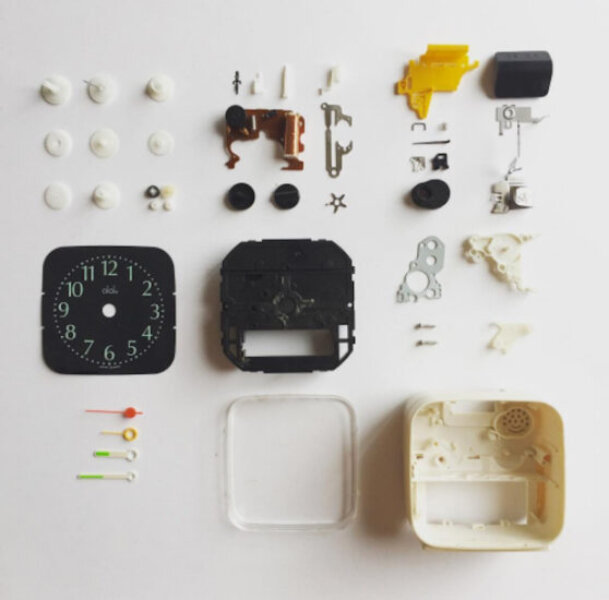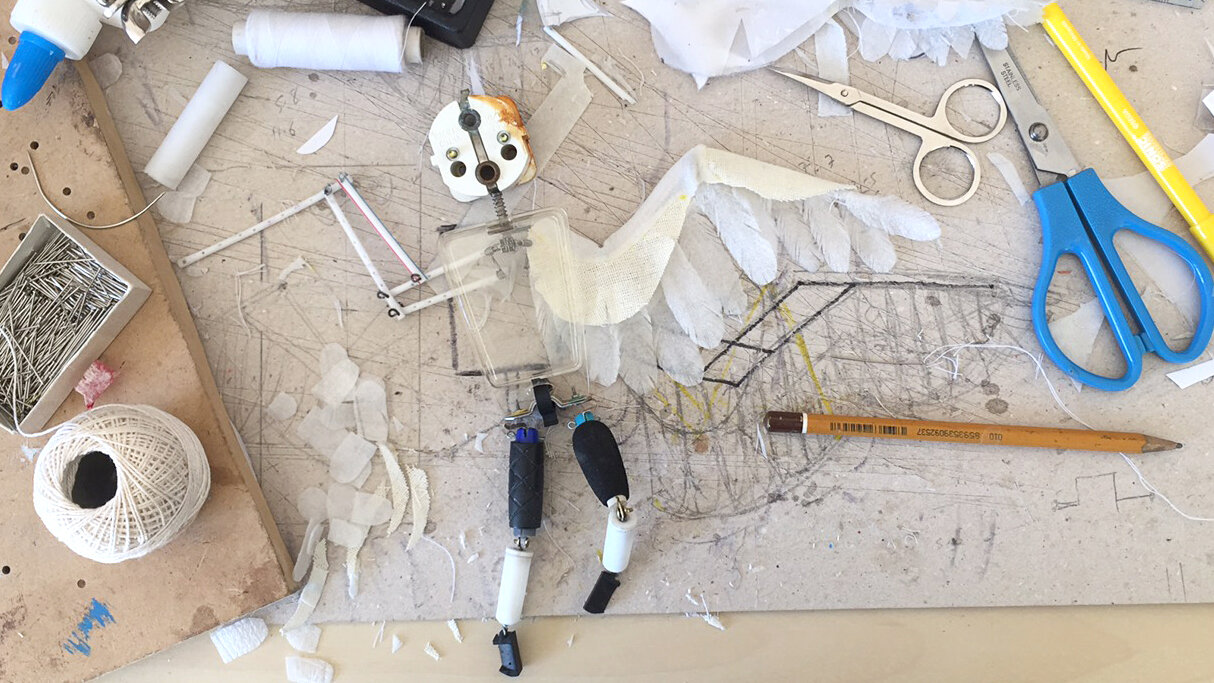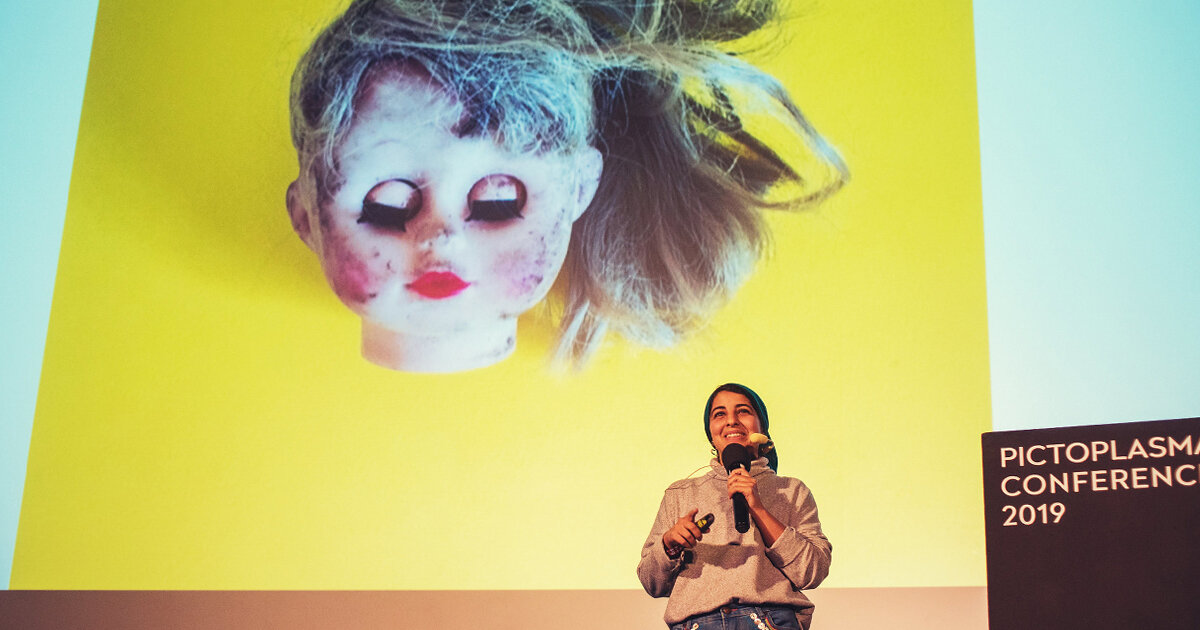
DINA AMIN: UPCYCLING E-WASTE TO REVEAL ITS INNER CHARACTER
Although trained as a product designer, Cairo based dina Amin loves to explore intersections between disciplines. In 2016, she started a side project ‘Tinker Friday’ on Instagram, where she combined her passion for product design and stop motion with consumerist critique, showing people what’s inside the countless things they throw away. We met up with her after her tinker workshop at Pictoplasma 2019, where attendees were invited to create characters out of broken smartphone parts, defunct earphones, and a mountain of obsolete electronic waste. She told us why she loves to take things apart, what our products reveal about us and the society we live in, and the complications of buying a Dremmel in Cairo.
Pictoplasma: The results of your workshop are surprisingly impressive.
dina Amin: They are! Most of the attendees I talked to were illustrators, graphic designers or painters and had never tinkered about with objects before.
The workshop had a very focused vibe.
I thought there would be a lot of questions but they got right down to business on their own: dissecting, welding, soldering, hacking, and reassembling. It was a long process, but they happily stuck with it.

The one question we kept hearing was: ‘How do I take this apart?’
Yes, that was indeed a problem. In Egypt almost all products I work with are from China: one gentle squeeze is usually enough for things to pop open. Most of the electronic waste in the workshop was ‘Made in Germany.’ Stuff here has a different quality…
… but once it breaks, it’s nearly impossible to repair.
Which is really sad. I once dropped my phone and the camera got a black dot on it, which made it useless. Instead of buying a new phone, I opened it, cleaned the camera and put it back in. Many companies deliberately make it hard for users to open the product so they can earn money for maintenance and repairs. But it’s actually very easy and consumers should have a right to fix their own products.
Thereby consuming and polluting less…
Exactly.

“At the beginning I was simply curious. Then, during the dissection process, I was amazed by the sheer amount of tiny pieces I discovered inside the products we use on a daily basis…”
Taking products apart to peek inside seems to have been a lifelong passion.
I’ve done it as far back as I can remember. It started with me taking out the eyes of my dolls. I stopped for a while until I studied product design in Malaysia. In one of our classes, we had to take an item apart and then rebuild it. From that moment on, it became like a hobby. Then when I started working I would always find an excuse to take things apart and make that part of the project. I would call it ‘research.’
Are there objects that interest you more than others?
I prefer the mechanical to the electrical. I love how all the inner parts are designed to interact and move together.

Listening to your talk at the conference, you also seem to focus on objects that reveal something about society.
Yes. For example with the hairdryer, I ask why people heat or burn their hair, thinking that’s how to take care of it. In Egypt, every girl has her own hairdryer. But we don’t use it to dry our hair. We use it to straighten it. In the Middle East long, straight hair is considered healthy. Short, curly hair is seen as bad hair. That makes no sense. So when I look at things, I don’t just see a hairdryer, I see all these cultural ideas that are imposed on us by society. And by the market, of course.
Why is it so important to show what’s inside a product?
At the beginning I was simply curious. Then, during the dissection process, I was amazed by the sheer amount of tiny pieces I discovered inside the products we use on a daily basis, like our phones, watches… I never imagined there would be so many! When I started sharing my dissection videos, the viewers had a similar reaction. They had no idea that even the simplest things are made of endless tiny parts. This made me think about how easily we throw things away just because one tiny element is broken. It means we’re wasting hundreds and thousands of perfectly fine products.
Instead of recycling them?
Yes, or reusing them to refurbish other broken products.
“… I see all these cultural ideas that are imposed on us by society. And by the market, of course.”
In your videos you use the inner parts of products to build fantastical little creatures that you animate using stop motion. You are creating non-functional objects instead of repairing the original ones.
From the things I collect, if there’s something I can repair then I repair it. But many of the things I get are actually broken.
You seem to do everything yourself—DIY from start to finish.
I do. Tinkering always was a very personal project and I never planned on it becoming my career. If you had told me two years ago that I would become a stop-motion-animator and have my own studio where I take apart waste, I would have been very skeptical. But to be honest I’d like to do more collaborative projects. If I ever make longer movies, I’d love to involve other designers and artists.
Do you also do commissioned work alone?
Not always. Sometimes an agency will get me an animation job for companies that provide an art director and everything. But then it’s no longer my style. They’ll use the word ‘creative’ a hundred times in one email, but as soon as I come up with any ideas, they’ll block and want me to realize their own, very basic idea, which is not creative at all.
What do you think these companies like about your personal work for them to call you?
They always say, ‘We saw your videos, and we were really taken by surprise.’ I do always like to add an element of surprise: an illusion, tricking people into seeing things that aren’t real, but are made of real things, so your brain gets confused. I think that’s what triggers their interest.

“Many companies deliberately make it hard for users to open the product so they can earn money for maintenance and repairs. But it’s actually very easy and consumers should have a right to fix their own products.”
Would you say your work is political, in the sense that it is critical of consumerism and promotes self-empowerment, especially for girls.
Yes, I would agree it has that message. People often send me photos of trash they proudly didn’t throw away, and tell what they’re planning on making out of it. Or they sit down with their kids, take a product apart and teach them how it works. It makes me really happy that people educate their kids—and themselves—because of my videos and become more aware of what they’re buying and what they’re throwing away.
In your presentation you talked about how in Egypt, many things are reserved for boys only. And how the girls you met as a student in Malaysia empowered you.
Egyptian girls are led to believe that they are incapable of doing lots of perfectly normal things. To operate a drill, for example, all you need to do is to push a button and it spins. There’s nothing more to it! Yet in Malaysia, the first time I entered the workshop at our school for industrial design, I was shocked: There were girls all over the place drilling, sawing, cutting and welding, making their own prototypes and mock-ups. In Egypt, we can’t even repair our own things at home. We have to call in a carpenter just to fix a door handle. Manpower is cheap in Egypt, so we don’t fix anything ourselves. In Malaysia they learn these skills. This is what I really liked about Malaysia, and I’d love to help make Egypt more like this very soon.
But aren’t you doing it already?
In a way, but I don’t mean doing it as a little message hidden in videos. I want to say it loud and clear. But I can’t talk about that yet.
You have a secret plan?
Yes.

Ok! But do you feel you have become a role model for girls?
Recently, some time after I posted the video of me taking my phone apart, a guy emailed me saying he had seen the video but couldn’t find it anymore, and if I could send him the link. I was scared that he’d opened his phone, destroyed it and now wanted to blame me. ‘What do you need it for?’ I asked. ‘I’m trying to convince my sister that she can open her phone and I told her about you doing it but she still doesn’t believe me!’
Nice brother. Some men are ready for a positive change.
Yes, but not all of them. Recently I decided to upcycle some of my furniture and needed tools like a hand-held circular saw. In Egypt, you don’t buy tools in stores, but there are entire streets dedicated to selling them.
There are other streets where all shops only sell art supplies or only handbags, right?
Exactly, it’s like a huge supermarket, where all shops of the area are dedicated to only one specific thing.
So you went to the tool street…
I was the only girl walking in the area and everyone was looking suspiciously at me. They couldn’t believe there was a girl in this neighborhood! What could she possibly be looking for? It was like when I tried to buy a Dremmel. The guy in the shop simply wouldn’t sell it to me. You know, just a regular rotary tool? But he was telling me, ‘No, don’t get this. It’s not for you. If you need to cut something, maybe just get normal scissors or something.’
How did you react?
I said, ‘If the Dremmel people knew that you were their sales person in Egypt, and you were refusing to sell the product, you’d be fired.’
Does it take courage or stubbornness?
Both! And every time I want to buy something in Egypt, I have to go through the same procedure over and over again. I get endless stupid questions and I get treated like an infant that doesn’t know what it wants. So I’ve been feeling a bit burnt out lately. This definitely needs to change.
“… now with the Internet, I can learn anything I want, anywhere.”
You get a lot of attention through the Internet. Are the reactions always positive?
Most comments are really nice. Some are meant well, but it’s the way they say them that makes them unpleasant. Certain terms and thought patterns are so common, but they’re really not helpful at all.
For example?
When people are happy for me because they see me as an underprivileged woman from a Third World country, it makes no sense to me. Of course there are some differences, like the difficulties we have in Egypt and women believing they can’t do certain things. But when it comes to creativity, why would you think you are more privileged? What does it actually require to be creative? Do you need expensive tools? No, this does not make you creative. Do you need a proper education? What is a proper education? Nowadays you can learn from so many different sources. Maybe 20 years ago when there was no access to all this information, but now with the Internet, I can learn anything I want, anywhere. I hope people drop their prejudices. We don’t always realize it, but these thinking patterns have a real effect on our world.

Interview by Elise Graton on the occasion of Pictoplasma Berlin, 2019
